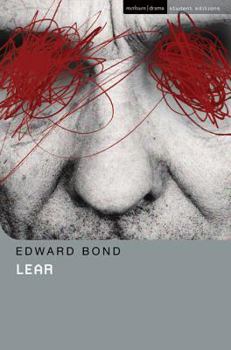Lear
Select Format
Select Condition 
Book Overview
Edward Bond's version of Lear's story embraces myth and reality, war and politics, to reveal the violence endemic in all unjust societies. He exposes corrupted innocence as the core of social morality, and this false morality as a source of the aggressive tension which must ultimately destroy that society. In a play in which blindness becomes a dramatic metaphor for insight, Bond warns that 'it is so easy to subordinate justice to power, but when...
Format:Paperback
Language:English
ISBN:0413519503
ISBN13:9780413519504
Release Date:May 2009
Publisher:Methuen Drama
Length:192 Pages
Weight:0.32 lbs.
Dimensions:0.5" x 5.3" x 7.8"
Customer Reviews
1 rating
Bond's Lear
Published by Thriftbooks.com User , 19 years ago
The overriding mechanism of the play is an image, a radiantly English image, of society as a mechanism or consuming beast, it consumes Cordelia as head of state, it destroys Lear as contrary to its purposes. He gives the simple understanding of the situation in the great third act: "If a God had made the world, might would always be right, that would be so wise, we'd be spared so much suffering. But we made the world--out of our smallness and weakness. Our lives are awkward and fragile and we have only one thing to keep us sane: pity, and the man without pity is mad." He's mad, of course, or call this a moment of lucidity before the end. Within the structure, Bond skillfully handles material from Kafka ("The Great Wall of China") and Frost ("Mending Wall"), tending toward Eliot's "Marina" in Act Two. The writing is sparse, the action is dramatic, until Act Three blooms into Lear's parable, Kafka by way of Charles M. Jones: "A man woke up one morning and found he'd lost his voice. So he went to look for it, and when he came to the wood there was the bird who'd stolen it. It was singing beautifully and the man said `Now I sing so beautifully I shall be rich and famous'. He put the bird in a cage and said, `When I open my mouth wide you must sing'. Then he went to the king and said, `I will sing your majesty's praises'. But when he opened his mouth the bird could only groan and cry because it was in a cage, and the king had the man whipped. The man took the bird home, but his family couldn't stand the bird's groaning and crying and they left him. So in the end the man took the bird back to the wood and let it out of the cage. But the man believed the king had treated him unjustly and he kept saying to himself `The king's a fool' and as the bird still had the man's voice it kept singing this all over the wood and soon the other birds learned it. The next time the king went hunting he was surprised to hear all the birds singing `The king's a fool'. He caught the bird who'd started it and pulled out its feathers, broke its wings and nailed it to a branch as a warning to all the other birds. The forest was silent. And just as the bird had the man's voice the man now had the bird's pain. He ran round silently waving his head and stamping his feet, and he was locked up for the rest of his life in a cage." Not Solomon in all his glory was arrayed by such a commentator. The Bard in this bleak, warlike world makes himself known by an untoward cruelty or a jest for groundlings, in a line or two. Gunplay replaces the swordfight. The main point of departure is the rapprochement of Cordelia and Lear, who sit as spies on the whole lot in indeterminate time and space. The Author's Preface argues in Bond's voice the image of the play, and reveals an eye for "the caricatures that pass for strength in our society--the hysterical old maids who become sergeant majors, the disguised peeping Toms who become moralists, the immature social misfits who become judges." T





